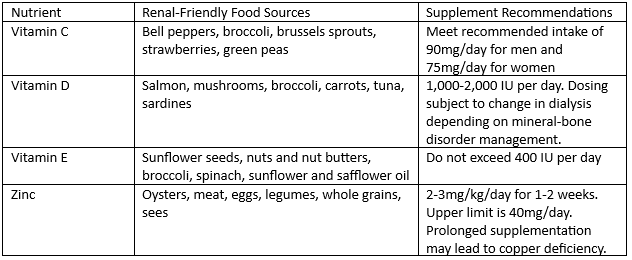
During cold and flu season there are a few things that come to mind to protect ourselves from bacteria and viruses. Things like vaccines,
regular handwashing, masking in public spaces, and maybe reaching for the echinacea or elderberry. But to boost our immune systems,
sometimes we need to think small, or micro.
Micronutrients are vitamins and minerals that the body needs in small amounts to maintain normal, healthy function. During bouts of illness, the body relies more heavily on these nutrients to mount an immune response. If these nutrients are unavailable, the body is limited and may not be able to fight off bacteria and viruses effectively.
This is especially concerning for people on dialysis as micronutrient deficiencies can be quite common. This is often due to their nutrient-limited diets they follow to maintain lower levels of phosphate and potassium intake and because dialysis itself easily removes small particles, including micronutrients.
Read on to learn about specific micronutrients of concern.
Vitamin C
Vitamin C is an important antioxidant and anti-inflammatory nutrient, some evidence supports getting adequate amounts to prevent serious viral infections like from Covid-19. Vitamin C is one of the most common nutrient deficiencies found in dialysis because it is so easily removed when dialyzing and because vitamin C-rich foods also tend to be high in potassium.
Vitamin D
Vitamin D is commonly thought of in relation to bone and mineral health, however, it is also an important stimulant for our innate immune system
and influences our adaptive immunity as well.
- The innate immune system is non-specific and allows our body to protect itself by creating barriers to prevent pathogens from entering the body. If a pathogen does break through, the innate immune cells alert the rest of our immune cells to mount a defense.
- Our adaptive immune system is able to direct other immune cells and create special types of cells based on whatever pathogen is being defended against. Adaptive immune cells also create memory of pathogens they encounter so they can respond more quickly in the future.
Vitamin D is difficult to get from food so often times people require a supplement in the form of active Vitamin D. See our table below to learn more about food sources and supplements.
Vitamin E
Vitamin E is most commonly deficient in the elderly, especially those on dialysis. Studies have found that when vitamin E levels are low in people 60 years and older, the risk of infection goes up. That’s because vitamin E helps cells in our body launch an immune response, if there is not adequate vitamin E
then there cannot be an adequate response.
Zinc
When zinc levels are low, immune cells do not properly develop or function. If zinc deficiency is present, correcting that deficiency has been shown
to reverse immune impairment and protect against severe infection.

Ensuring adequate nutrition applies to all nutrients from amino acids (protein), a macronutrient, all the way down to zinc, a trace mineral.
To keep our immune systems functioning well this cold and flu season we need to ensure wholesome nutrition at every level.
To learn more about macro and micronutrients that support good health, including for protein-malnourished patients on dialysis, check out the resources
on our Clinical Login.
References:
-
- Jankowska, M., Rutkowski, B., & Dębska-Ślizień, A. (2017). Vitamins and microelement bioavailability in different stages of chronic kidney disease. Nutrients, 9(3), 282.
- Kosmadakis, G., Da Costa Correia, E., Carceles, O., Somda, F., & Aguilera, D. (2014). Vitamins in dialysis: who, when and how much?. Renal failure, 36(4), 638-650.
- Ikizler, T. A., Burrowes, J. D., Byham-Gray, L. D., Campbell, K. L., Carrero, J. J., Chan, W., … & Cuppari, L. (2020). KDOQI clinical practice guideline for nutrition in CKD: 2020 update. American Journal of Kidney Diseases, 76(3), S1-S107.
- Syed-Ahmed, M., & Narayanan, M. (2019). Immune dysfunction and risk of infection in chronic kidney disease. Advances in chronic kidney disease, 26(1), 8-15.
We thank our guest blogger Maiya Slusser, MS, RDN, CD, CNSC, for sharing her knowledge and writing this blog post!

